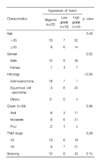Abstract
Background
Fascin is an actin-bundling protein that plays an important role in cellular motility. Fascin is normally expressed in the neuronal and mesenchymal cells and its expression is low or absent in the epithelia. However, an overexpression of fascin has been linked to the invasive behavior of some neoplasms such as breast, stomach and ovarian tumors. In this study, we evaluated the expression of fascin and its prognostic significance in stage I non-small cell lung cancer (NSCLC).
Methods
Immunohistochemical staining for fascin was performed on the paraffin-embeded tissue sections of 81 cases of resected NSCLC. Staining of more than 5% of the tumor cells was recorded as positive immunoreactivity.
Figures and Tables
Figure 1
Immunohistochemical stainings for fascin in non-small cell lung cancer. (A) Negative fascin expression (×100). (B) Positive fascin expression (×100).

References
1. Minna JD. Kasper DL, Braunwald E, Fauci AS, Hauser SL, Longo DL, Jameson JL, editors. Chapter 75. Neoplasms of the lung. Harrison's principles of internal medicine. 2005. 16th ed. New York: McGraw-Hill Co, Inc;506–515.
2. Hilsenbeck SG, Raub WA Jr, Sridhar KS. Prognostic factors in lung cancer based on multivariate analysis. Am J Clin Oncol. 1993. 16:301–309.
3. Mountain CF. New prognostic factors in lung cancer. biologic prophets of cancer cell aggression. Chest. 1995. 108:246–254.
4. Zhu CQ, Shih W, Ling CH, Tsao MS. Immunohistochemical markers of prognosis in non-small cell lung cancer: a review and proposal for a multiphase approach to marker evaluation. J Clin Pathol. 2006. 59:790–800.
5. Niklinski J, Niklinska W, Laudanski J, Chyczewska E, Chyczewski L. Prognostic molecular markers in non-small cell lung cancer. Lung Cancer. 2001. 34:S53–S58.
6. Steeg PS. Tumor metastasis: mechanistic insights and clinical challenges. Nat Med. 2006. 12:895–904.
7. Carragher NO, Frame MC. Focal adhesion and actin dynamics: a place where kinases and proteases meet to promote invasion. Trends Cell Biol. 2004. 14:241–249.
8. Kureishy N, Sapountzi V, Prag S, Anikumar N, Adams JC. Fascins, and their roles in cell structure and function. Bioessays. 2002. 24:350–361.
9. Yamashiro S, Yamakita Y, Ono S, Matsumura F. Fascin, an actin-bundling protein, induces membrane protrusions and increases cell motility of epithelial cells. Mol Biol Cell. 1998. 9:993–1006.
10. Hashimoto Y, Shimada Y, Kawamura J, Yamasaki S, Imamura M. The prognostic relevance of fascin expression in human gastric carcinoma. Oncology. 2004. 67:262–270.
11. Yoder BJ, Tso E, Skacel M, Pettay J, Tarr S, Budd T, et al. The expression of fascin, an actin-bundling motility protein, correlates with hormone receptor-negative breast cancer and a more aggressive clinical course. Clin Cancer Res. 2005. 11:186–192.
12. Hashimoto Y, Skacel M, Adams JC. Roles of fascin in human carcinoma motility and signaling: prospects for a novel biomarker? Int J Biochem Cell Biol. 2005. 37:1787–1804.
13. Choi PJ, Yang DK, Son CH, Lee KE, Lee JI, Roh MS. Fascin immunoreactivity for preoperatively predicting lymph node metastases in peripheral adenocarcinoma of the lung 3 cm or less in diameter. Eur J Cardiothorac Surg. 2006. 30:538–542.
14. Pelosi G, Pastorino U, Pasini F, Maissoneuve P, Fraggetta F, Iannucci A, et al. Independent prognostic value of fascin immunoreactivity in stage I nonsmall cell lung cancer. Br J Cancer. 2003. 88:537–547.
15. Bryan J, Edwards R, Matsudaira P, Otto J, Wulfkuhle J. Fascin, an echinoid actin-bundling protein, is a homolog of Drosophila singed gene product. Proc Natl Acad Sci U S A. 1993. 90:9115–9119.
16. Hu W, McCrea PD, Deavers M, Kavanagh JJ, Kudelka AP, Verschraegen CF. Increased expression of fascin, motility associated protein, in cell cultures derived from ovarian cancer and in borderline and carcinomatous ovarian tumors. Clin Exp Metastasis. 2000. 18:83–88.




 PDF
PDF ePub
ePub Citation
Citation Print
Print




 XML Download
XML Download